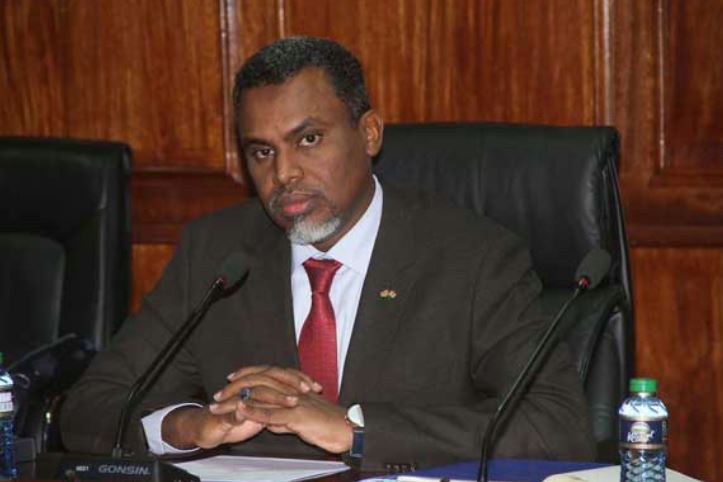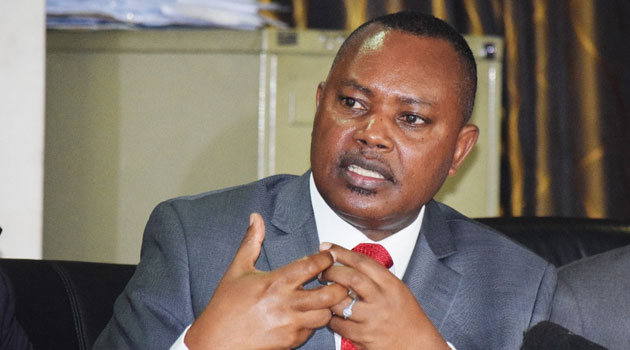
The Ethics and Anti-Corruption Commission and the Directorate of Criminal Investigations has engaged in anti-graft war.
This comes after EACC publicly told the office of the DCI to keep-off the investigation of economic crimes, laying bare their quiet turf wars.
According to EACC vice chairperson Sophia Lepuchirit, “In every integrity survey that is done, the police department is always at the top in corruption, and this means that they cannot be trusted to fight graft,” Lepuchirit said in Naivasha last week.

On Wednesday she “clarified” that her remarks were taken out of context. Insiders said pressure from EACC big wigs, who do not want to be seen openly questioning the ability of the police, forced her to swallow her words.
She further added saying, the commission has and continues to work closely with the Directorate of Criminal Investigations in corruption cases under the multi-agency team that also includes the DPP’s office.
She further added saying, “I firmly believe that for any meaningful strides to be realised in combating corruption, all agencies should partner, collaborate and partner towards a common purpose of a society free of corruption.”

The blistering attack on the DCI came at a time when the new team led by George Kinoti are determined to give the organisation an image makeover.
Kinoti and the new DPP Noordin Haji are the new anti-corruption experts and seem to be pleasing the president much more than the EACC.
Observers and the media have been quick to notice that the EACC has been missing in action in the second NYS scandal, Kenya Power, Kenya Bureau of Standards and poison sugar investigations.

In the NYS, Kenya Power and KEBS cases, Kinoti and Haji have struck at the heart of the parastatals by staging dramatic arrests of senior executives sending a chilling message to the high and the mighty.
EACC has on the other hand charged Busia governor Sospeter Ojaamong with a Sh8 million procurement case and is still struggling to put together a watertight case in the Ruaraka land case.
According to section 7 of the EACC Act, the commission is mandated to investigate corruption, prevent graft, advise public institutions on how to fight corruption, educate the public, enlist public support in fighting corruption and economic crime and recover ill-gotten wealth.

On the other hand, under the National Police Service Act, 2011 DCI has the mandate to not only to collect and provide criminal intelligence, but also undertake investigations of homicide, narcotics crimes, human trafficking, money laundering and terrorism.
It is also mandated to investigate economic crimes, piracy, organised crimes, and cyber crime, apprehend offenders, conduct forensic analysis and to execute instructions from the Inspector General by the Director of Public Prosecutions pursuant to article 157( 4 ) of the constitution.
According to Police spokesman Charles Owino, “Almost all EACC investigators are policemen, starting with the head of investigations…They are not just former officers, there are many policemen whom they have requested and we have seconded there.”

In defence of the police, he said even EACC Chief Executive Officer Halakhe Waqo is facing corruption allegations, but which cannot be taken as gospel truth.
Owino was referring to a court case filed by a former EACC detective who has linked Waqo to several graft claims including the controversial acquittal of suspects in the first NYS scandal.
Adan Guracha claimed Waqo received kickbacks to interfere with cases and in the process pocketed Sh300 million to bungle the NYS probe.
According to Owino, “While carrying out my duties, I came across sensitive information linking Waqo to the NYS scandal of 2015/16 in which he played a major role in bringing the case to a premature end.”
Guracha, who has sued for wrongful dismissal, claimed in court papers.
Owino said the police is a giant and formidable institution with over a 100,000 staff.
Owino further added saying, “These policemen are Kenyans, we are not getting them from Europe or South Africa and we have agreed as a country that we are marred with a lot of corruption. And if there is corruption, it takes two to tango.”
The police spokesman said both the EACC and DCI work for the same government and must work in harmony.
“If the executive is of the opinion that a certain case be undertaken by a certain department, no other department can question that. You would be undermining the authority of the executive.”
According to ODM Secretary General Edwin Sifuna, “At the end of the day, it is not who brings which matter to court. What Kenyans are interested in is convictions of those who have stolen publish cash, we have complained for a very long time about the ineffectiveness of EACC. They have messed up a lot of cases…If the police have been ranked as the most corrupt as they [EACC] say, it’s their job to prosecute corruption, how many senior police officers have they convicted?”
EACC now says 127 cases are in jeopardy following the precedent, and that the country stands to lose Sh16 billion.
Aldai MP Cornelly Serem, who has drafted a bill to have the EACC disbanded, said the agency has failed to demonstrate why the Treasury should continue to provide cash to the agency yet there is no result for show for it.
“EACC has been here. It’s not like they are introducing themselves. But nothing has happened. They have not stopped the fight. We have given them responsibility and it’s us to judge whether they are doing it well. And we are saying they are under performing,” said Serem.
At one point, even President Uhuru Kenyatta appeared to express faith in the DCI and the DPP than the EACC.
In his Madaraka Day speech on June 1 in Meru, Uhuru made no mention of EACC as he highlighted the work conducted by the anti-graft agencies.
“The Director of Public Prosecutions, the police and other institutions in the multi-agency team against corruption are on the move. They are making decisive steps to build strong cases for the prosecution of corrupt officials,” Uhuru said.